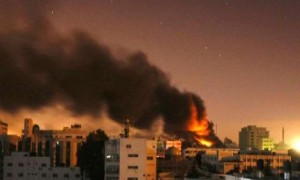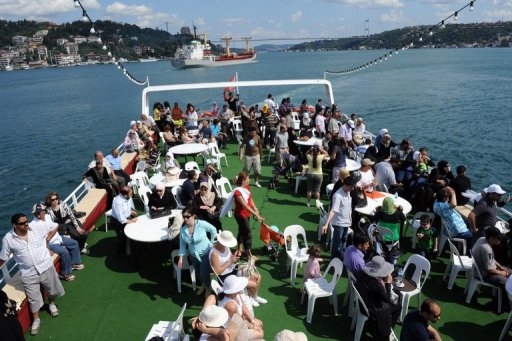
Tensions are on the rise between Israel and the international community, after Israel launched operation Pillars of Defence on Wednesday, aimed at neutralising the threat of rocket attacks from Gaza.
On Thursday, Israeli media reported three Israeli civilian fatalities due to a missile strike. On Wednesday, at least twenty Israeli airstrikes were carried out in the Gaza strip, killing at least seven people and injuring more than 60. Among the dead was Ahmed Jaabari, a senior military commander from Hamas and his bodyguard. The Israeli operation has sparked outrage in the Middle East, with condemnation coming from several countries.
Iran called the operation an act of “organised terrorism,” while Qatar’s prime minister said the Israeli attack should not go unpunished.
In Egypt, the Muslim Brotherhood was quick to denounce the violence against Palestinians. Shortly after news broke of Jaabari’s death, the Brotherhood condemned the “serious escalation [of] the Zionist army, which was built on murder and terrorism.” The statement also called for an emergency Arab League meeting, saying, “if we blame these [pro-Israeli] countries we must also blame the Arab countries that see the blood of the Palestinians and do nothing.”
The Brotherhood demanded that non-aligned states convene and hold discussions to make “critical decisions,” and called for a protest to be held on Friday across the country in front of mosques. In an official reaction, the Egyptian government recalled its ambassador to Israel and condemned the violence. During a telephone call with the US secretary of state Hillary Clinton, the Minister of Foreign Affairs
Mohamed Amr warned of the consequences of military escalation caused by “the Israeli aggression on the Palestinian people in Gaza,” and demanded an immediate cessation of hostility. He added that the situation would spiral out of control should the US not urge Israel to stop.
At the time of writing, at least 13 Gazans have died since the onset of the offensive. This figure is a compilation of local Palestinian radio reports compiled by an Egyptian-Palestinian in Khan Younis. Some reports suggest the youngest fatality is 11 months old, Ynet reported.
According to Israel, over 100 rockets have been fired into Israel since the beginning of the operation, 30 of which the Israeli Defence Force claim were intercepted by the Iron Dome missile defence system.
The United States government issued a stern warning aimed at Hamas, and said on Wednesday “there is no justification for the violence that Hamas and other terrorist organisations are employing against the people of Israel.”
US president Barrack Obama spoke with President Mohamed Morsy and Israeli Prime Minister Benjamin Netanyahu by telephone on Thursday. During his talks with Netanyahu, Obama stressed the US support Israel’s right to defend itself. He urged Netanyahu take the precautionary measures to avoid civilian casualties. Obama and Netanyahu agreed Hamas must first cease firing rockets into Israel to allow for the situation to calm.
In his conversation with Morsy, Obama promised to keep an open line of communication with Egypt and, considering Egypt’s role in preserving regional security, agreed with Morsy that the two nations must work towards a de-escalation of the situation.
Hamas issued a statement on their official website, condemning Israel’s attack and assassination of Jaabari, promising Israel will pay “a heavy price for assassinating leaders of the resistance.”
The United Nations Security Council issued a statement on Wednesday saying Ban Ki Moon had been in talks with Netanyahu and Morsy, but made no mention of any talks with Hamas and its leadership. The council convened Wednesday night in a closed session to discuss the situation.
Ban told Netanyahu he was concerned about Hamas attacks on Israel and Jaabari’s assassination. He condemned Hamas for their attacks, but fell short of condemning Israel for its retaliatory airstrikes across the Gaza Strip.
Both Israel and Hamas hold each other accountable for the violence.
The violence comes as the Palestinian National Authority President Mahmoud Abbas has made a bid to the General Assembly for recognition as a state. While an assembly resolution would give Abbas’ government more diplomatic legitimacy, it would not be a binding resolution.
The Security Council operates on a veto system and member rotation. Resolutions passed by the council are, unlike the general assembly resolutions, binding. The problem lies within its veto system, awarded to the permanent members of the council, which allow for any resolution to be struck off immediately regardless how many members vote in favour. Currently the US, Russia, China, France and the United Kingdom are the five permanent members, with another ten elected by region every two years.
The US strongly opposes granting recognition to a state of Palestine because they believe it must first reach peace with Israel.


